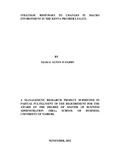| dc.description.abstract | This study sought to establish how Kenya Premier League football clubs responds to
changes in the external environment which is political, economic, social,
technological, legal and ecological factors. Factors that led to choice of some
strategies and not others were also established. The study was anchored on Game
Theory which assesses strategic interactions in which the outcome of one’s choices
depends on the choices of the others. The study adopted an exploratory research
design since not much is researched on KPL management at the Kenyan scholarly
level. Qualitative data was collected through interviews which were administered face
to face by the interviewer to the purposively sampled respondents. The targeted
respondents were secretaries, CEO’s and chairmen of seven clubs in the Kenya
Premier League. Data collected from the seven club officials was analyzed using
content analysis by putting it into context and presenting it in prose form. The study
found that the league is affected by all macro environmental factors except ecological
changes. Economic changes were top of list in affecting the clubs negatively in
operations followed by political changes. Further, the study established that a club
sponsorship structure greatly affects the response strategy adopted to changes in the
external environment. During the course of this study, limitation was experienced in
getting the key respondents for the interview due to the high intensity of football
matches around the time of research, making the club secretaries and chairmen
extremely busy. Additional studies in the Kenya Premier League and the sports
industry in general, on its responses to internal environment would be viable in future.
The researcher recommends a fully planned, organized and controlled strategic layout
for Kenya Premier League. This will be perfectly achieved once the clubs abide to the
recently introduced Sports Act, signed into Law in January 2013. Further, the
community clubs should be managed independently as a legal entity which will leave
them off their tribal kins who manipulate the club’s management hindering their
growth. Also, KPL clubs should initiate more organizations to nurture young talents
for continuity purposes and better coaching of players. What is coming up now is that
the government has finally appreciated that sports is a business, which when
professionally managed, the society will benefit more from this recreational game.
Keywords: Strategic Responses, Macro environment, Kenya Premier League, Game
theory. | en |

